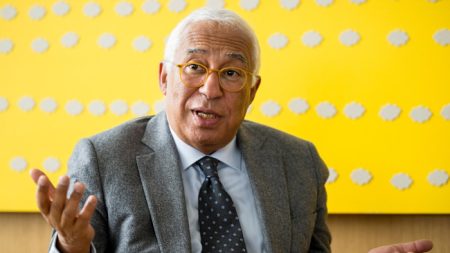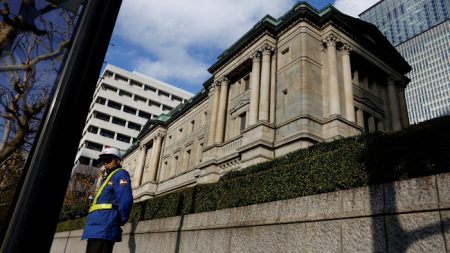Unlock the Editor’s Digest for free
Roula Khalaf, Editor of the FT, selects her favourite stories in this weekly newsletter.
France’s central bank governor has warned of a political uncertainty “shock” and said that business leaders were slowing down investments and hiring as they hedge against possible tax increases.
“Business leaders are telling us they are worried about the wait-and-see approach of their customers who are choosing to save instead of spend, about delay of investment, and about freezing hiring,” François Villeroy de Galhau told France Info radio on Thursday.
A snap parliamentary election called by President Emmanuel Macron delivered a fragmented assembly in which no party or alliance has a clear path to power, increasing concerns about France’s ballooning public deficit not being reined in anytime soon.
“There’s a second golden rule which relates to deficits, which is that we cannot dig deeper ones. They weigh on our sovereignty and cost more and more to finance,” Villeroy de Galhau said.
The central banker stressed the importance of not stifling companies reeling from inflation, as parties across the political spectrum jostle to lead the next government, including the leftwing Nouveau Front Populaire (NFP) alliance with a high-tax and big spending programme.
“In a competitive world our small businesses cannot be weighed down by excessive wage costs, including on the minimum wage, and by taxes that would be too onerous,” Villeroy de Galhau said.
He warned such measures could eventually lead to higher unemployment, which in the long run would be worse for household budgets.
The NFP, which came first in Sunday’s vote, has said it wants to raise the net minimum wage to €1,600 a month from around €1,400 were it to govern, as well as restore a form of wealth tax that Macron had changed into a property levy. The leftwing alliance also wants to repeal Macron’s pension reform that raised the retirement age by two years to 64.
After securing 180 seats in the 577-strong assembly, ahead of Macron’s Ensemble alliance and Marine Le Pen’s far-right Rassemblement National, the NFP has been trying to name the next prime minister, and may put forward a candidate as early as Thursday.
Macron on Wednesday implied that he did not want to designate a prime minister from the leftwing NFP because a key part of the alliance includes a far-left party, La France Insoumise, which he considers holds positions that clash with democratic norms.
He called for a broad “governing pact” of mainstream parties to end the impasse, but it is still unclear how such a formula will be found. His government led by Prime Minister Gabriel Attal is still in place for now.
Other parties including the conservative Les Républicains and members of Macron’s Ensemble alliance have also said they will not form a cabinet with the far left.
The risk premium on France’s benchmark 10-year debt over Germany’s rose to 0.85 percentage points ahead of the first round of votes for France’s legislative election, the highest level since the depths of the euro crisis and up from around 0.5 percentage points before the election was called.
However, investors were reassured that neither the far-right RN nor the left alliance won a majority in parliament, with French bonds recovering some of their losses as the spread has fallen to 0.64 percentage points.
Macron’s government had already slipped up on the budget deficit in 2023, overshooting its target of 4.9 per cent of output by a significant margin to finish the year at 5.5 per cent. It blamed the miss on lower-than-expected tax revenues after years of heavy spending including during the Covid-19 pandemic.
That has added to the pressure on any government on its room to manoeuvre, given that the EU put France in a so-called excessive deficit procedure.
Drafting of next year’s budget in the autumn would be a key moment, said Gérard Larcher, the conservative president of the French Senate. He added that any government that presented an irresponsible plan risked being brought down.
“It will be a moment of responsibility for all in parliament to help the country avoid the risk of a financial and economic rout. Companies are now stuck in wait-and-see mode. We need to give them more confidence.”
Economy minister Bruno Le Maire said in an op-ed on Thursday that France needed to maintain its target for €25bn of spending cuts in 2024, some €15bn of which have already been carried out, to keep public finances on track.
“There are always political alternatives, which the people alone can decide. But everyone must be clear what these alternatives imply,” Le Maire said.
Additional reporting by Mary McDougall in London
Read the full article here














